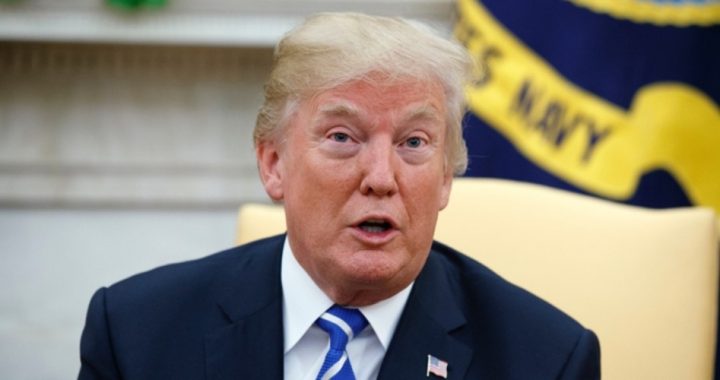
Following President Trump’s condolence call to Myeshia Johnson, the widow of Sergeant La David T. Johnson (one of four American servicemen killed in an ambush in the African country of Niger), Representative Frederica Wilson (D-Fla), who was in the car with family members when the call came in, publicly castigated Trump, calling his remarks “horrible” and “insensitive.”
“He said, Well, I guess you know, something to the effect that ‘he knew what he was getting into when he signed up, but I guess it hurts anyway,’” Wilson said to MSNBC.
“It was horrible. It was insensitive. It was absolutely crazy, unnecessary. I was livid,” Wilson said.
In a statement to the media, Trump denied making that statement, saying: “Didn’t say what that congresswoman said. Didn’t say it at all. She knows it and she is now not saying it. I did not say what she said and I’d like her to make the statement again.”
During a session with the media, White House Press Secretary Sarah Huckabee Sanders said that although there was no transcript of Trump’s call, Chief of Staff John Kelly was with the president during the call and thought it was appropriate. Kelly “thought the call was respectful and he thought that the president did the best job he could under those circumstances to offer condolences on behalf of the country,” said Sanders.
On October 19, Kelly defended Trump’s handling of the call to Johnson’s widow, and condemned Wilson for politicizing the issue.
“There’s no perfect way to make that phone call,” Kelly said in his first public comments on the incident since the controversy erupted. “If you’ve never worn the uniform, if you’ve never been in combat, you can’t even imagine how to make that call, but I think he very bravely does make those calls.”
Fox News reported that Kelly condemned Wilson for listening to Trump’s phone call to Johnson’s widow and then criticizing the president’s wording in the press.
“I was stunned when I came to work yesterday morning and broken-hearted, at what I saw a member of Congress doing — a member of Congress who listened in on a phone call from the president” to the widow, Kelly told reporters.
“It stuns me that a member of Congress would have listened in on that conversation, absolutely stuns me.… I thought at least that was sacred,” he said, condemning what he called Wilson’s “selfish behavior.”
As the controversy over Trump’s call to Johnson’s widow escalated, another Gold Star widow released to the public a recording of the call she received from the president, which she shared because it demonstrates a side of Trump likely to be overlooked.
Natasha De Alencar lost her husband, Army Staff Sergeant Mark R. De Alencar, in Afghanistan on April 8. He was killed during a gun battle with Islamic State terrorists.
“I am so sorry to hear about the whole situation,” Trump said Mrs. De Alencar. “What a horrible thing except that he’s an unbelievable hero and you know all the people that served with him are saying how incredible he was, and just an amazing, an amazing guy.”
The president added, “I just wanted to call you and just tell you that he’s a great hero.”
Trump also invited De Alencar and her entire family to visit him in the Oval Office.
De Alencar told the Washington Post her call with the president meant a lot to her and her entire family.
“It was a moment of niceness that we needed because we were going through hell,” she said.
Johnson was one of four military members killed by what have been described as “ISIS-Inspired Fighters” in Niger while working on an advise-and-assist mission in support of Niger’s security forces in the southwestern part of the country.
Army Colonel Mark Cheadle briefed reporters at the Pentagon, describing the mission as one that was not meant to be an engagement with the enemy.
“It was meant to establish relations with the local leaders and the threat at the time was deemed to be unlikely…. But our allies the French were very quick to respond with their assets immediately upon notification that it was needed,” Cheadle said.
CNN reported that there are about 800 U.S. troops in Niger and that the U.S. military has maintained a presence there for five years. Small groups of U.S. Special Operations Forces are in the country advising local troops as they battle terrorist groups, including Islamic State in Greater Sahara, the ISIS-affiliated Boko Haram, and al-Qaeda’s North African branch, al-Qaeda in the Islamic Maghreb.
“U.S. forces are in Niger to provide training and security assistance to the Nigerien Armed Forces, including support for intelligence, surveillance and reconnaissance efforts, in their efforts to target violent extremist organizations in the region,” said CNN, quoting an October 18 statement from U.S. Navy Lieutenant Commander Anthony Falvo, a spokesman for U.S. Africa Command. Falvo said, “one aspect of that is training, advising and assisting the Nigeriens in order to increase their ability to bring stability and security to their people.”
“Niger is an important partner of ours, we have a deep relationship with them,” Lieutenant General Kenneth McKenzie, the director of the Joint Staff, told reporters at the Pentagon on October 19. “We are committed to that relationship, we believe that they are as well in fact I think it’s a very good success story.”
It is safe to say that before the death of Sergeant Johnson, few Americans were aware that the United States has military personnel stationed in Niger. It serves as an indication of just how widespread our military involvement in far-flung areas of the world is, and how costly our interventionist foreign policy has become.
The real controversy over Johnson’s death should not be whether President Trump used exactly the right words to console his widow, but why Johnson was stationed in Niger in the first place.
Photo: AP Images



